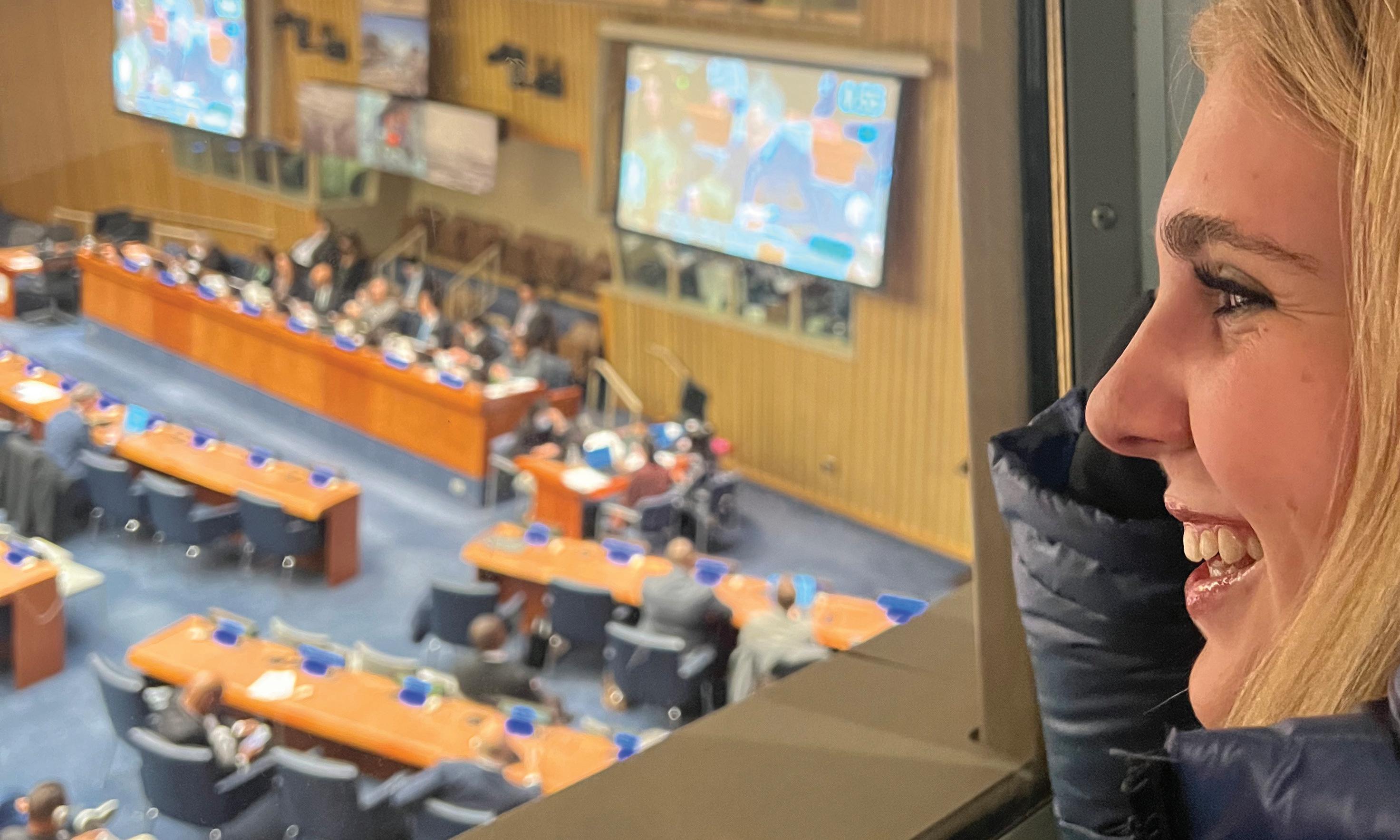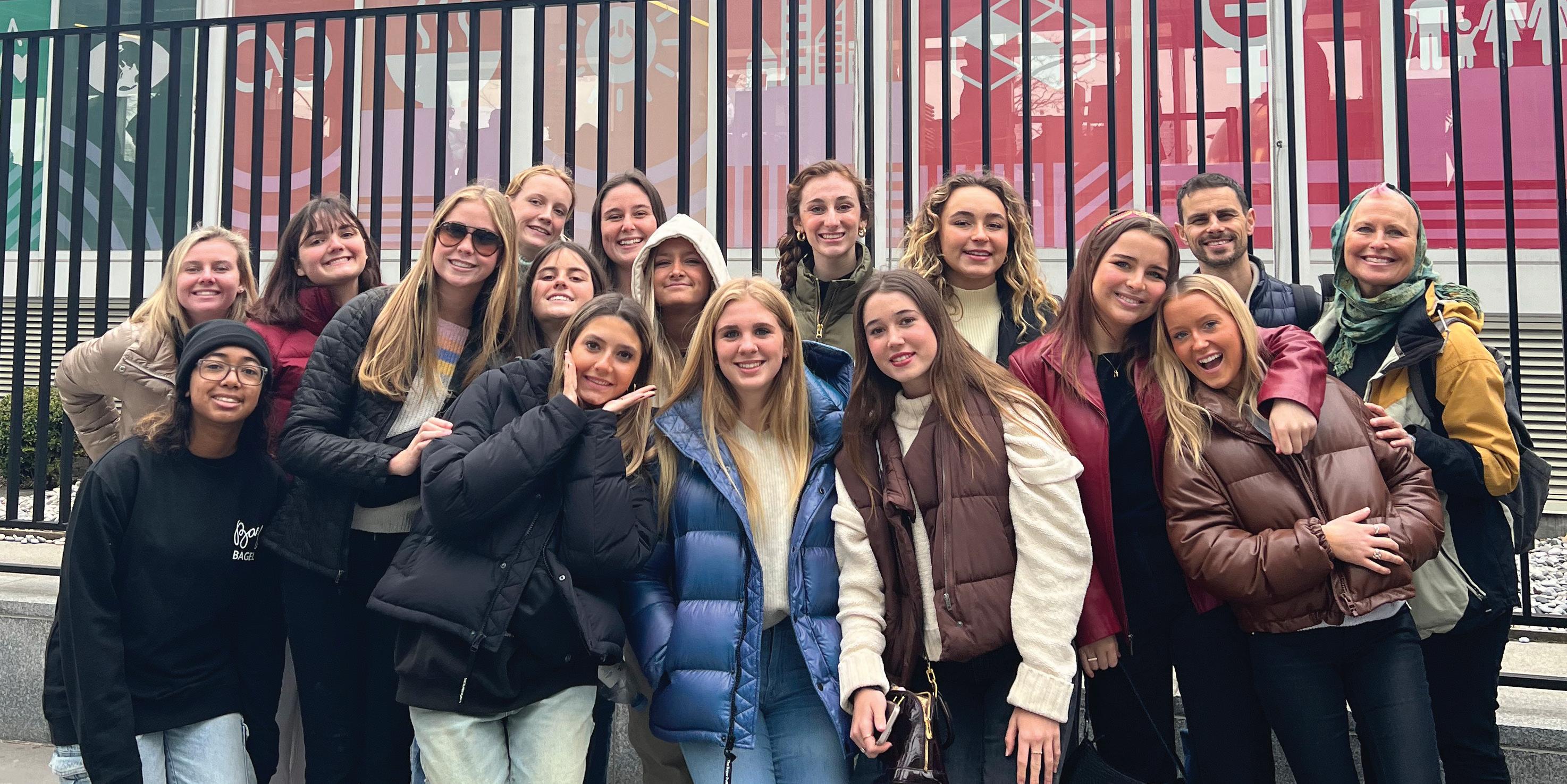
8 minute read
Do You Know Your Human Rights?
WRITTEN AND PHOTOGRAPHED BY LIZ REGALIA
In 1948, the Universal Declaration of Human Rights (UDHR) established 30 fundamental human rights for people in all nations that should be universally protected. Today, the Declaration holds the Guinness World Record as the most translated document, and it can be read in over 500 languages. Still, many Americans are unaware of their inherent rights as human beings.
On the 75th anniversary of the creation of the UDHR, Upper School humanities teacher Andrea Muti and Visual Arts Department Chair Nancy Langston collaborated to launch Ashley Hall’s newest signature travel program aimed to educate students on the enduring importance of protecting our human rights. In March 2023, 15 students in grades 10-12 embarked on a four-day trip entitled Building Bridges, Not Walls to New York City, America’s quintessential melting pot and host of the United Nations Headquarters.
“Through this cross-curricular experience, students gain insight into the roles that the United Nations and artists play in supporting and fostering human rights and the human experience,” Muti explains. “In essence, they unite, empower, and build bridges amongst individuals, communities, and nations.”
While in New York City, students visited the National September 11 Memorial & Museum, Ellis Island, the Rubin Museum of Art, the Metropolitan Museum of Art, and the United Nations Headquarters. They also visited the U.S. Mission for the United Nations where the group heard from U.N. staff members about how the UDHR is just as integral today as it was 75 years ago to the mission of the United Nations, which is to maintain international peace and security.
After witnessing themes of immigration, international relations, and terrorism, as well as how art can educate and be a catalyst for change and unity, students returned home and revisited the articles of the UDHR. Here, they reflect with a new point of view on how the protection of different human rights empowers us all.

Article 1:
ALL HUMAN BEINGS ARE BORN FREE AND EQUAL IN DIGNITY AND RIGHTS.
“In order to create an inclusive society, you need to have a voice from everyone. No culture, race, or ethnicity should be treated lower than another. While I was in New York, I noticed how diverse the people were. Walking around, there were so many different types of people expressing their cultures and beliefs. This is important because it shows how all together, so many people can create a peaceful society while still getting the same rights and freedom.” – Madeleine Ambrite ’25
Article 3:
EVERYONE HAS THE RIGHT TO LIFE, LIBERTY, AND SECURITY OF PERSON.
“I feel this is a motto that New York City lives by, and it is a huge part of what makes it so special. When we visited Ellis Island, it was extremely interesting to read the personal stories and individual hardships immigrants had to face in order to make it to a new country alive. The conditions of the ships they arrived in were awful, and many would die before making it ashore. However, when they arrived in New York City, they were granted rights which might have been unfamiliar to them: they were in control of their own lives.” – Faye Bailey ’25
Article 5:
NO ONE SHALL BE SUBJECTED TO TORTURE OR TO CRUEL, INHUMAN OR DEGRADING TREATMENT OR PUNISHMENT.
“Whether it’s torture or dehumanizing actions of any kind, this one article is barely a sentence long, but it holds strong enough power to prevent any kind of inhuman actions to anyone. It gives me hope that the world will someday have peace because this article protects many lives. When reading it, I immediately think of the 9/11 Memorial & Museum, since the event was a sign of terrorism. However, I recently learned that after 9/11, the United States arrested and dehumanized many Afghans who they suspected to be Taliban simply because of how they looked. I wondered if this article could connect with not only terrorism, but that type of biased mistreatment. I’m a humanitarian, and I don’t like seeing any person in trouble. So for there to be a rule against torture and dehumanization proves to me that peace could be made in this world.” – Kiki Trevino ’25
Article 26:
EVERYONE HAS THE RIGHT TO EDUCATION.
“Because of the creation of Article 26, everyone regardless of their background, gender, race, and beliefs have a right to an education. Because of my access to an education, I was able to visit New York and learn about so many topics. When speaking with United Nations staff, we discussed the war in Ukraine and the importance of being informed and educated on current events happening around the world. Regardless if we are directly affected, it is our duty and responsibility to spread awareness, be well informed, and know how we can help. I think visiting the U.N. gave everyone a new perspective on how they handle difficult international situations and the difficult process of having to consider all perspectives of the people involved.” – Lavina Maybank ’24








